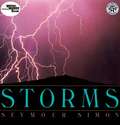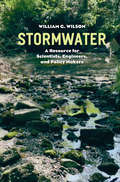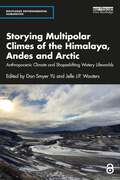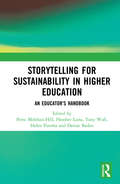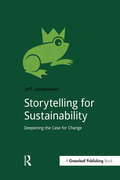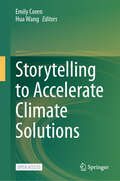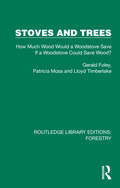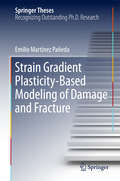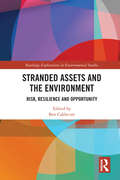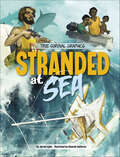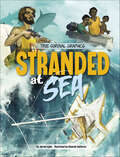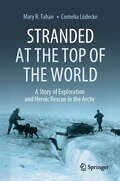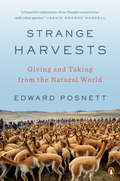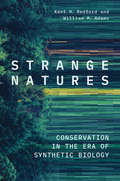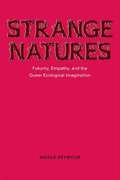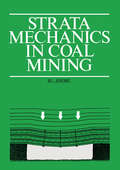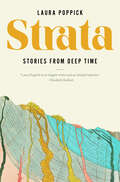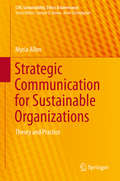- Table View
- List View
Storms
by Seymour Simon"A succinct, informative essay illuminated by magnificent photographs. The subject is particularly absorbing, as it highlights the natural drama of a commonly experienced phenomenon. . . . The stunning visual portrayal of storms, accompanied by impressive factual data and clear explanations in crisp prose, is truly compelling. "--Horn Book.
Storms (National Geographic Kids Readers)
by Miriam Busch GoinStorms are SCARY! But it&’s cool to understand what&’s going on when Mother Nature gets angry. Why does the wind howl? Why does it rain for days? How do rivers overflow? Thunder and lightening, monsoons, hurricanes, tornadoes... the facts and photos in this book will blow you away!
Stormwater: A Resource for Scientists, Engineers, and Policy Makers
by William G. WilsonAs cities grow and climates change, precipitation increases, and with every great storm—from record-breaking Boston blizzards to floods in Houston—come buckets of stormwater and a deluge of problems. In Stormwater, William G. Wilson brings us the first expansive guide to stormwater science and management in urban environments, where rising runoff threatens both human and environmental health. As Wilson shows, rivers of runoff flowing from manmade surfaces—such as roads, sidewalks, and industrial sites—carry a glut of sediments and pollutants. Unlike soil, pavement does not filter or biodegrade these contaminants. Oil, pesticides, road salts, metals, automobile chemicals, and bacteria all pour into stormwater systems. Often this runoff discharges directly into waterways, uncontrolled and untreated, damaging valuable ecosystems. Detailing the harm that can be caused by this urban runoff, Wilson also outlines methods of control, from restored watersheds to green roofs and rain gardens, and, in so doing, gives hope in the face of an omnipresent threat. Illustrated throughout, Stormwater will be an essential resource for urban planners and scientists, policy makers, citizen activists, and environmental educators in the stormy decades to come.
Storying Multipolar Climes of the Himalaya, Andes and Arctic: Anthropocenic Climate and Shapeshifting Watery Lifeworlds (Routledge Environmental Humanities)
by Dan Smyer Yü Jelle J.P. WoutersThis book initiates multipolar climate/clime studies of the world’s altitudinal and latitudinal highlands with terrestrial, experiential, and affective approaches. Framed in the environmental humanities, it is an interdisciplinary, comparative study of the mutually-embodied relations of climate, nature, culture, and place in the Himalaya, Andes, and Arctic. Innovation-driven, the book offers multipolar clime case studies through the contributors’ historical findings, ethnographic documentations, and diverse conceptualizations and applications of clime, an overlooked but returning notion of place embodied with climate history, pattern, and changes. The multipolar clime case studies in the book are geared toward deeper, lively explorations and demonstrations of the translatability, interchangeability, and complementarity between the notions of clime and climate. "Multipolar" or "multipolarity" in this book connotes not only the two polar regions and the tectonically shaped highlands of the earth but also diversely debated perspectives of climate studies in the broadest sense. Contributors across the twelve chapters come from diverse fields of social and natural sciences and humanities, and geographically specialize, respectively, in the Himalayan, Andean, and Arctic regions. The first comparative study of climate change in altitudinal and latitudinal highlands, this will be an important read for students, academics, and researchers in environmental humanities, anthropology, climate science, indigenous studies, and ecology. Chapters 8 and 9 of this book are freely available as a downloadable Open Access PDF at http://www.taylorfrancis.com/books/e/10.4324/9781003347026 under a Creative Commons Attribution-Non Commercial-No Derivatives (CC-BY-NC-ND) 4.0 license.
Storytelling for Sustainability in Higher Education: An Educator's Handbook
by Tony Wall Petra Molthan-Hill Heather Luna Denise Baden Helen PunthaTo be a storyteller is an incredible position from which to influence hearts and minds, and each one of us has the capacity to utilise storytelling for a sustainable future. This book offers unique and powerful insights into how stories and storytelling can be utilised within higher education to support sustainability literacy. Stories can shape our perspective of the world around us and how we interact with it, and this is where storytelling becomes a useful tool for facilitating understanding of sustainability concepts which tend to be complex and multifaceted. The craft of storytelling is as old as time and has influenced human experience throughout the ages. The conscious use of storytelling in higher education is likewise not new, although less prevalent in certain academic disciplines; what this book offers is the opportunity to delve into the concept of storytelling as an educational tool regardless of and beyond the boundaries of subject area. Written by academics and storytellers, the book is based on the authors’ own experiences of using stories within teaching, from a story of “the Ecology of Law” to the exploration of sustainability in accounting and finance via contemporary cinema. Practical advice in each chapter ensures that ideas may be put into practice with ease. In addition to examples from the classroom, the book also explores wider uses of storytelling for communication and sense-making and ways of assessing student storytelling work. It also offers fascinating research insights, for example in addressing the question of whether positive utopian stories relating to climate change will have a stronger impact on changing the behaviour of readers than will dystopian stories. Everyone working as an educator should fi nd some inspiration here for their own practice; on using storytelling and stories to co-design positive futures together with our students.
Storytelling for Sustainability: Deepening the Case for Change
by Jeff LeinaweaverStorytelling is an ancient practice and a priceless skill. For sustainability practitioners who want to be more strategic and have more influence in shaping a better world, it is a crucial skill to master.In this short guide, veteran sustainability strategist and storyteller Jeff Leinaweaver shows you which ways of storytelling "transmit resonance" and lead to success and which lead to failure.You will learn techniques for using storytelling to attract attention and get better results, whether you are communicating statistics and priorities, advocating for change, organizing stakeholders, or building an authentic brand and community.Storytelling for Sustainability offers a comprehensive primer on storytelling and a range of insights and practical exercises, including: the failure of the sustainability story, discovering your passionate fact, your convenience story, reverse storyboarding, and what’s my storyline?
Storytelling to Accelerate Climate Solutions
by Hua Wang Emily CorenThe climate is changing faster than our cultural practices are adapting to it. This Open Access volume, co-edited by Emily Coren (a science communicator) and Hua Wang (a communication scientist), presents a survey of the latest in agency-focused climate storytelling. Together, practitioners and scholars across different fields shared their knowledge, experience, and insight about how stories can be designed and told to engage, enable, and empower individuals and communities in climate communication and action. You will learn a wide range of narrative strategies and exemplary applications of climate storytelling in terms of professional practices (e.g., education, literature, journalism, popular media), genres and formats (e.g., drama, comedy, fiction), media platforms (e.g., television, radio, mobile), and communication modalities (e.g., text, visual, audio, multisensory). Entertainment-education has been proven over decades to be an effective tool for social and behavior change in the public health sphere and has not yet been applied at scale to the massive ongoing climate–related disasters that we need to solve now, fast. There is an urgent need to rapidly apply and adapt public engagement tools for climate communication to speed up our response times for climate change mitigation and adaptation. This book takes a snapshot of where climate storytelling is currently at, describes where it fits within a climate communication landscape, and supports the next steps of its development. It facilitates the of creation climate storytelling efficiently by sharing and amplifying what is working well, and building collaborations between practitioners and researchers.This is an open access book.
Stoves and Trees: How Much Wood Would a Woodstove Save If a Woodstove Could Save Wood? (Routledge Library Editions: Forestry)
by Lloyd Timberlake Gerald Foley Patricia MossOriginally published in 1984, Stoves and Trees asks whether better stoves really help the two billion people in the developing world who rely on wood and charcoal for cooking and heating their homes. It also asks if improved stoves actually save fuel and if they can help slow down tropical deforestation. The book not only examines newer stoves but also ascertains how people buy, collect and use wood in the developing world. It finds that most forests are cleared for timber or farmland not fuelwood and explains why stoves which show 50% energy savings in European laboratories often save little or none in village homes.
Strain Gradient Plasticity-Based Modeling of Damage and Fracture
by Emilio Martínez PañedaThis book provides a comprehensive introduction to numerical modeling of size effects in metal plasticity. The main classes of strain gradient plasticity formulations are described and efficiently implemented in the context of the finite element method. A robust numerical framework is presented and employed to investigate the role of strain gradients on structural integrity assessment. The results obtained reveal the need of incorporating the influence on geometrically necessary dislocations in the modeling of various damage mechanisms. Large gradients of plastic strain increase dislocation density, promoting strain hardening and elevating crack tip stresses. This stress elevation is quantified under both infinitesimal and finite deformation theories, rationalizing the experimental observation of cleavage fracture in the presence of significant plastic flow. Gradient-enhanced modeling of crack growth resistance, hydrogen diffusion and environmentally assisted cracking highlighted the relevance of an appropriate characterization of the mechanical response at the small scales involved in crack tip deformation. Particularly promising predictions are attained in the field of hydrogen embrittlement. The research has been conducted at the Universities of Cambridge, Oviedo, Luxembourg, and the Technical University of Denmark, in a collaborative effort to understand, model and optimize the mechanical response of engineering materials.
Strand Theatre Fire, The: The 1941 Brockton Tragedy and the Fallen Thirteen (Disaster)
by Brockton Fire Chief Foreword By Galligan James E. Casper RetiredOn March 10, 1941, at 12:38 a.m., the Brockton Fire Department responded to Fire Alarm Box 1311, which was pulled for a fire at the Strand Theatre. Fire Alarm dispatched the deputy chief, three engine companies, a ladder company and Squad A. Within six minutes, a second alarm was struck. Less than one hour after the first alarm, the roof of the Strand collapsed, and what appeared to be a routine fire turned into a disaster that killed thirteen firefighters and injured more than twenty others. The disaster marks one of the largest losses of life to firefighters from a burning building collapse in the United States. Jim Benson and Nicole Casper chronicle this devastating tragedy and celebrate the community’s heroes and resilience in the face of adversity.
Stranded Assets and the Environment: Risk, Resilience and Opportunity (Routledge Explorations in Environmental Studies)
by Ben CaldecottDrawing on the work of leading researchers and practitioners from a range of disciplines, including economic geography, economics, economic history, finance, law, and public policy, this edited collection provides a comprehensive assessment of stranded assets and the environment, covering the fundamental issues and debates, including climate change and societal responses to environmental change, as well as its origins and theoretical basis. The volume provides much needed clarity as the discourse on stranded assets gathers further momentum. In addition to drawing on scholarly contributions, there are chapters from practitioners and analysts to provide a range of critical perspectives. While chapters have been written as important standalone contributions, the book is intended to systematically take the reader through the key dimensions of stranded assets as a topic of research inquiry and practice. The work adopts a broad based social science perspective for setting out what stranded assets are, why they are relevant, and how they might inform the decision-making of firms, investors, policymakers, and regulators. The topic of stranded assets is inherently multi-disciplinary, cross-sectoral, and multi-jurisdictional and the volume reflects this diversity. This book will be of great relevance to scholars, practitioners and policymakers with an interest in include economics, business and development studies, climate policy and environmental studies in general.
Stranded at Sea (True Survival Graphics)
by Jarred LujánThree teens run out of gas while island-hopping in the South Pacific. A lone sailor drifts on an inflatable life raft in the vast Atlantic. Four men cling to their capsized sailboat far off the New Zealand coast. These remarkable true tales could have ended in tragedy—but they didn’t! What happened when these people found themselves stranded at sea for weeks on end? And how did they survive to tell their tales? Young readers will find out in this easy-to-read hi-lo graphic novel that will keep them on the edge of their seats!
Stranded at Sea (True Survival Graphics)
by Jarred LujánThree teens run out of gas while island-hopping in the South Pacific. A lone sailor drifts on an inflatable life raft in the vast Atlantic. Four men cling to their capsized sailboat far off the New Zealand coast. These remarkable true tales could have ended in tragedy—but they didn’t! What happened when these people found themselves stranded at sea for weeks on end? And how did they survive to tell their tales? Young readers will find out in this easy-to-read hi-lo graphic novel that will keep them on the edge of their seats!
Stranded at the Top of the World: A Story of Exploration and Heroic Rescue in the Arctic
by Cornelia Lüdecke Mary R. TahanThis book provides a well-researched, well-structured, interesting, and informative narrative depicting the little-known yet successful efforts of the Captain Arve Staxrud Norwegian Arctic Rescue Expedition of 1913 that searched for and saved members of the Lieutenant Herbert Schröder-Stranz German Arctic Expedition of 1912 in Spitsbergen (Svalbard). The book portrays the cooperative and strategic endeavors of the humans and animals involved in the Staxrud expedition who worked together to save human lives on the icy fjords and glaciers of the far north during an unseasonable time of year for exploratory expeditions. It examines and analyzes the unpreparedness and lack of training that resulted in the failure of the Schröder-Stranz expedition. It compares and contrasts concurrent rescue expeditions that failed, including the Kurt Wegener expedition and the Theodor Lerner expedition. It describes the crucial role of animals in both the Norwegian and German expeditions, as well as German interest and Norwegian activity in Spitsbergen leading up to the expeditions. And it reconstructs the interaction and organization of principal officers, overwintering experts, Norwegians, Sámi, draft reindeer teams, and experienced sledge dogs who made the Staxrud rescue mission a success and who created and enabled improved search and rescue capabilities for Spitsbergen and for the future of the Arctic archipelago.
Strands: A Year of Discoveries on the Beach
by Jean SpracklandStrands describes a year's worth of walking on the ultimate beach: inter-tidal and constantly turning up revelations: mermaid's purses, lugworms, sea potatoes, messages in bottles, buried cars, beached whales and a perfect cup from a Cunard liner. This is a series of meditations prompted by walking on the wild estuarial beaches of Ainsdale Sands between Blackpool and Liverpool, Strands is about what is lost and buried then discovered, about all the things you find on a beach, dead or alive, about flotsam and jetsam, about mutability and transformation - about sea-change.
Strange Creatures of the Snow and Other Great Mysteries
by Edward F. DolanDiscusses some unusual creatures and events that have been seen or taken place in cold climates including sightings of the mysterious Yeti, and the discovery of the remains of a nineteenth-century polar expedition.
Strange Harvests: The Hidden Histories of Seven Natural Objects
by Edward PosnettAn original and magical map of our world and its riches, formed of the stories of the small-scale harvests of seven natural objectsIn this beguiling book, Edward Posnett journeys to some of the most far-flung locales on the planet to bring us seven wonders of the natural world--eiderdown, vicuña fiber, sea silk, vegetable ivory, civet coffee, guano, and edible birds' nests--that promise ways of using nature without damaging it. To the rest of the world these materials are mere commodities, but to their harvesters they are imbued with myth, tradition, folklore, and ritual, and form part of a shared identity and history.Strange Harvests follows the journeys of these uncommon products from some of the most remote areas of the world to its most populated urban centers, drawing on the voices of the people and little-known communities who harvest, process, and trade them. Blending history, travel writing, and interviews, Posnett sets these human stories against our changing economic and ecological landscape. What do they tell us about capitalism, global market forces, and overharvesting? How do local microeconomies survive in a hyperconnected world? Is it possible for us to live together with different species? Strange Harvests makes us see the world with wonder, curiosity, and new concern.
Strange Natures: Conservation in the Era of Synthetic Biology
by William M. Adams Kent H. RedfordA groundbreaking examination of the implications of synthetic biology for biodiversity conservation Nature almost everywhere survives on human terms. The distinction between what is natural and what is human-made, which has informed conservation for centuries, has become blurred. When scientists can reshape genes more or less at will, what does it mean to conserve nature? The tools of synthetic biology are changing the way we answer that question. Gene editing technology is already transforming the agriculture and biotechnology industries. What happens if synthetic biology is also used in conservation to control invasive species, fight wildlife disease, or even bring extinct species back from the dead? Conservation scientist Kent Redford and geographer Bill Adams turn to synthetic biology, ecological restoration, political ecology, and de-extinction studies and propose a thoroughly innovative vision for protecting nature.
Strange Natures: Futurity, Empathy, and the Queer Ecological Imagination
by Nicole SeymourIn Strange Natures, Nicole Seymour investigates the ways in which contemporary queer fictions offer insight on environmental issues through their performance of a specifically queer understanding of nature, the nonhuman, and environmental degradation. By drawing upon queer theory and ecocriticism, Seymour examines how contemporary queer fictions extend their critique of "natural" categories of gender and sexuality to the nonhuman natural world, thus constructing a queer environmentalism. Seymour's thoughtful analyses of works such as Leslie Feinberg's Stone Butch Blues, Todd Haynes's Safe, and Ang Lee's Brokeback Mountain illustrate how homophobia, classism, racism, sexism, and xenophobia inform dominant views of the environment and help to justify its exploitation. Calling for a queer environmental ethics, she delineates the discourses that have worked to prevent such an ethics and argues for a concept of queerness that is attuned to environmentalism's urgent futurity, and an environmentalism that is attuned to queer sensibilities.
Strange Spaces: Explorations into Mediated Obscurity
by André JanssonCertain bizarre spaces, where disruption or disarray rule, leave us estranged and 'out of place'. This book examines such spaces, highlighting the emotional and mediated geographies of uncertainty and the state of being 'in-between'; of cognitive displacement, loss, fear, or exhilaration. It expands on why space is sometimes estranging and for whom it is strange. It is the first book to link strangeness and spatial production, as well as empirical explorations of strange spaces within a profound theoretical discussion of 'what is strange about strange spaces' and how they evolve in a modern media age.
Strangers and Neighbours
by Jeremy HayhoeThough historians have come to acknowledge the mobility of rural populations in early modern Europe, few books demonstrate the intensity and importance of short-distance migrations as definitively as Strangers and Neighbours. Marshalling an incredible range of evidence that includes judicial records, tax records, parish registers, and the census of 1796, Jeremy Hayhoe reconstructs the migration profiles of more than 70,000 individuals from eighteenth-century northern Burgundy.In this book, Hayhoe paints a picture of a surprisingly mobile and dynamic rural population. More than three quarters of villagers would move at least once in their lifetime; most of those who moved would do so more than once, in many cases staying only briefly in each community. Combining statistical analysis with an extensive discussion of witness depositions, he brings the experiences and motivations of these many migrants to life, creating a virtuoso reconceptualization of the rural demography of the ancien régime.
Strata Mechanics in Coal Mining
by Michael L. JeremicThis book is offered as a contribution to the spread of knowledge and understanding in the field of strata mechanics in coal mining. It is written for professionals in the coal mining industry and students of mining engineering and includes some of the author's own philosophy of coal mine stability.
Strata: Stories from Deep Time
by Laura Poppick"[A]n extraordinary book." —Marcia Bjornerud, author of Turning to Stone A revelatory journey through four moments in Earth’s deep past, and their lessons for our future. The epic stories of our planet’s 4.54-billion-year history are written in strata—ages-old remnants of ancient seafloors, desert dunes, and riverbeds striping landscapes around the world. In this brilliantly original debut work, science writer Laura Poppick decodes strata to lead us on a journey through four global transformations that made our lives on Earth possible: the first accumulations of oxygen in the atmosphere; the deep freezes of "Snowball Earth"; the rise of mud on land and accompanying proliferation of plants; and the dinosaurs’ reign on a hothouse planet Poppick introduces us to the researchers who have devoted their careers to understanding the events of deep time, including the world’s leading stegosaur scientist. She travels to sites as various as a Minnesotan iron mine that runs half a mile deep and a corner of the Australian Outback where glacial deposits date from the coldest times on Earth. Ultimately, she demonstrates that the planet’s oceans, continents, atmosphere, life, and ice have always conspired to bring stability to Earth, even if we are only just beginning to understand how these different facets interact. A work in the tradition of John McPhee, Strata allows us to observe how the planet has responded to past periods of environmental upheaval, and shows how Earth’s ancient narratives could hold lessons for our present and future.
Strategic Choices for a Turbulent World: In Pursuit of Security and Opportunity
by Robert J. Lempert Frank Camm Howard J. Shatz Debra Knopman Andrew R. Hoehn Anita Chandra Richard H. Solomon Burgess Laird Casimir Yost Sonni EfronThis report is the last of a six-volume series in which RAND explores the elements of a national strategy for the conduct of U.S. foreign policy. It analyzes U.S. strengths and weaknesses, and suggests adaptations for this new era of turbulence and uncertainty. The report offers three alternative strategic concepts and evaluates their underlying assumptions, costs, risks, and constraints.
Strategic Communication for Sustainable Organizations
by Myria AllenThis is a seminal book for anyone who wants to understand, shape or study the communication surrounding sustainability in their interactions with colleagues, employees, supply chain partners and external stakeholders. It develops essential insights on the basis of an extensive review of relevant theories and research drawn from multiple disciplines. Interview data gathered from organization members who are currently communicating about sustainability in their cities, universities, nongovernmental organizations, small businesses and large for-profit organizations provide valuable insights from a practitioner's perspective. The interviewees represent organizations such as the Portland Trailblazers, Tyson Foods, the City and County of Denver and the Natural Resources Defense Council. Theory, research and interview comments combine in a reader-friendly way to provide practical insights and stimulate future research.
